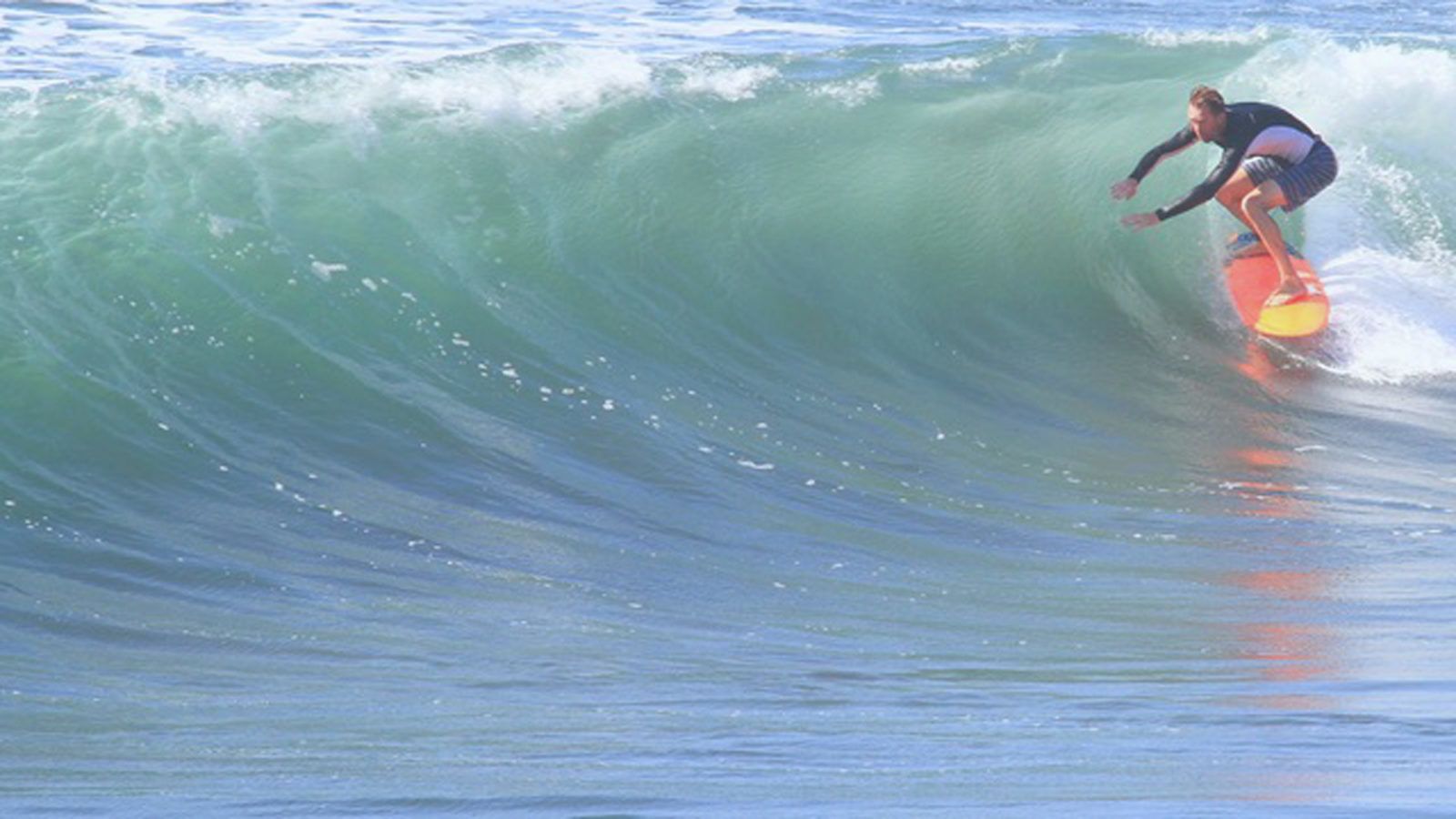For David Walden, a Southern Californian, surfing is a lifestyle, not a hobby. The 38-year-old works nights at a seafood restaurant to leave his mornings free for surfing.
While the surfers are doing what they love, they are also collecting information that is helping scientists better understand the ocean.
"Once you fall in love with the ocean, you need it like a daily cleanse or refresher," he says. "The positive mental and physical effects of the ocean, the endorphins and dopamine, keep you addicted in a good way."
Given his dedication to surfing, Walden was delighted when he became one of more than 200 surfers last year to test Smartfin, a 5-1/2-inch surfboard fin that contains a circuit board, a rechargeable battery, a GPS device, a sensor that captures temperature to one-hundredth of a degree, and a motion sensor that tracks the movement of the waves. While Walden and his fellow surfers are doing what they love, they are also collecting information that is helping scientists better understand the health of the near-shore ocean and how its chemistry is shifting due to climate change.
"I'm excited to be a part of it," Walden says. "I like to tell people I surf for science."
Back on shore, the surfers download the Smartfin data via a smartphone app so they can be accessed by scientists and other interested parties. (You can see where Smartfin surfers go at this interactive map.)
By putting sensors directly onto surfboards, oceanographers can collect data to help them better understand the global-warming related changes occurring in coastal oceans in temperature, salinity, and pH, all properties that have huge implications for the species that live in near-shore ecosystems.
There is much unknown about coastal waters because it's so difficult to obtain meaningful measurements. Traditional methods to monitor the close shore, such as bottle samples and buoys, are time consuming and expensive and tend to get damaged by the surf.
The Smartfin is the brainchild of Dr. Andy Stern, a retired neurologist. He and his brother-in-law, sculptor and filmmaker Todd McGrain, run The Lost Bird Project, a nonprofit devoted to raising awareness about climate change and other environmental issues. Stern brought his super fin idea to engineer Benjamin Thompson, who spent several years creating a prototype in his garage workshop. Smartfin was further developed by scientists at the Scripps Institution of Oceanography at the University of California at San Diego.
"The big challenge was to make a sensor small enough to fit in the fin but still produce good measurements," says Andreas Andersson, an associate professor of geoscience research at Scripps.
The Surfrider Foundation, a surfer-led nonprofit environmental organization, came aboard two years ago to distribute the Smartfin to its San Diego members.
Smartfin has also made a splash with scientists at the University of the Sunshine Coast in Queensland on the eastern coast of Australia. They are using the fin's temperature sensor to better understand how climate change is affecting the movement and distribution of marine life. And at the Plymouth Marine Laboratory in Plymouth, United Kingdom, the Smartfin's precise temperature readings of the near-shore ocean's surface are being used to improve the accuracy of satellites that monitor the ocean from hundreds of miles away.
"It's hard to talk about climate change in a way that's not boring or gloomy, but there's nothing gloomy or depressing about surfers and Smartfin."
"The hope is that Smartfin will improve the satellite measurements, which could improve the retrieval of temperature data around the world," says Dr. Phil Bresnahan, Smartfin's lead engineer at Scripps. In the future, the fin will include sensors to measure pH, chlorophyll (algae), dissolved oxygen, and turbidity (water clarity).
Stern envisions a time when thousands of surfers, paddle boarders, and other water enthusiasts worldwide will have Smartfins and be downloading data for scientists and environmentalists. Right now, there are approximately 70 surfers in the San Diego area using Smartfin and an additional 30 globally.
Scientists have plenty of evidence that global warming is largely caused by humans. Now they are trying to figure out what the long-term effects of climate change may be. For example, scientists are trying to predict which sections of coral reef, which house 25 percent of marine species, are most vulnerable so interventions can be developed to save them. Because of its small size, Smartfin is ideal to measure temperature changes in coral reefs.
Smartfin was also intended to be an educational tool. "It's a great way to start a different conversation about climate change," says Stern. "It's hard to talk about climate change in a way that's not boring or gloomy, but there's nothing gloomy or depressing about surfers and Smartfin. People want to hear more."
Turning surfers into citizen scientists makes perfect sense, says David Pasquini, 35, a longtime surfer who works for the British Consulate General's office in Oceanside, Calif. "Anyone who spends a lot of time in the ocean is aware of the changes happening in the ecosystem, the climate," says Pasquini. "Everyone asks, 'What can I do?'" Surfing with Smartfin, Pasquini feels like he is giving back.
"I know the data will be analyzed and eventually used to make a policy that helps with climate change. That's a great feeling--just by surfing, doing something you love, you're contributing."
